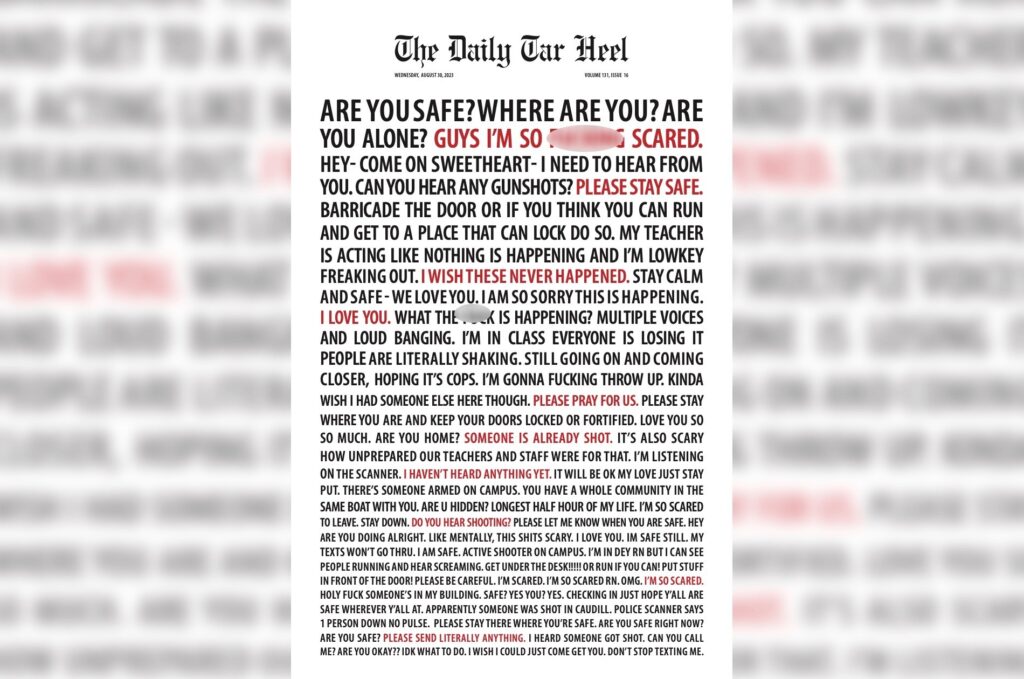This story is syndicated from The Daily Tar Heel, the newspaper of the University of North Carolina. The original version of the story ran here.
I never thought I’d visit the White House for anything other than a public tour.
But, on Sept. 22, I sat in the Rose Garden as President Joe Biden announced the first-ever federal office dedicated to gun violence prevention.
As advocates and politicians mingled in the garden, I looked around for someone a little closer to my age. That’s when I met a young woman named Elizabeth.
“What brought you here?” I asked, trying to break the ice. It was her first time at the White House, too.
Elizabeth responded, saying she was a survivor of the mass shooting in Parkland, Fla.
She said it with a chilling casualness — like she’d said it many times before. Then, she asked me why I was there. I told her I experienced UNC’s recent campus shooting.
We exchanged sympathies and condolences, then laughed awkwardly over the fact that we had just compared school shootings the same way others might compare hometowns. It’s a connection I wish we didn’t have in common.
The next time I looked around the garden and saw people my age, I could only think one thing: “Survivors.”
More than 356,000 students have experienced gun violence at school since the Columbine High School massacre, according to data collected by The Washington Post. UNC students were added to that tally on Aug. 28. Some not for the first time.
According to the Gun Violence Archive, there have been more than 31,000 gun violence deaths so far this year. UNC associate professor Zijie Yan was added to that number on Aug. 28.
I never thought I’d be a guest at the White House — just as I never thought I’d experience a campus shooting.
I was invited because my school newspaper created a front page that drew national attention. I felt a bit out of place, though. I’m not a student activist, I’m a student journalist.
The Daily Tar Heel’s Aug. 30 cover gained attention because people could relate to the text messages UNC students sent and received, while they were in locked classrooms or behind barricaded doors during an active shooter situation.

About half — 54 percent — of all U.S. adults say they or a family member have been affected by gun violence in their personal lives, according to a poll by nonprofit researcher KFF.
The Pew Research Center found that 44 percent of Americans say they personally know someone who has been shot.
Put simply, the DTH’s front page gained people’s attention, including Biden’s, because too many people have sent an “Are you safe?” text. Or received one.
I wish no one had to.
“At the end of the day, whether they’re Democrats or Republicans, we all want our families to be safe,” Biden said in the Rose Garden. “We all want to go to school, houses of worship, grocery stores, gyms, malls, movies without constant anxiety.”
I hope we can all agree that gun violence should be prevented. I hope that all Americans can see the effects gun violence has on their children.
I want to sit in a classroom without checking if the door has a lock. I want my friends to stop having nightmares about school shootings.
As I sat in the Rose Garden, I listened to Vice President Kamala Harris talk about her visits to college campuses, where she asked students to raise their hands if they had participated in an active shooter drill.
“Every time, every time, a sea of hands goes up because in today’s world, on the first day of school, students learn the name of their teacher, yes, they learn the location of their cubby — and they learn how to quietly hide from an active shooter,” Harris said.
Many attendees shook their heads in dismay when she said that. But when I looked at Elizabeth and other young people around me, I recognized their numbness.
We’re tired of being the ‘lockdown generation.’



